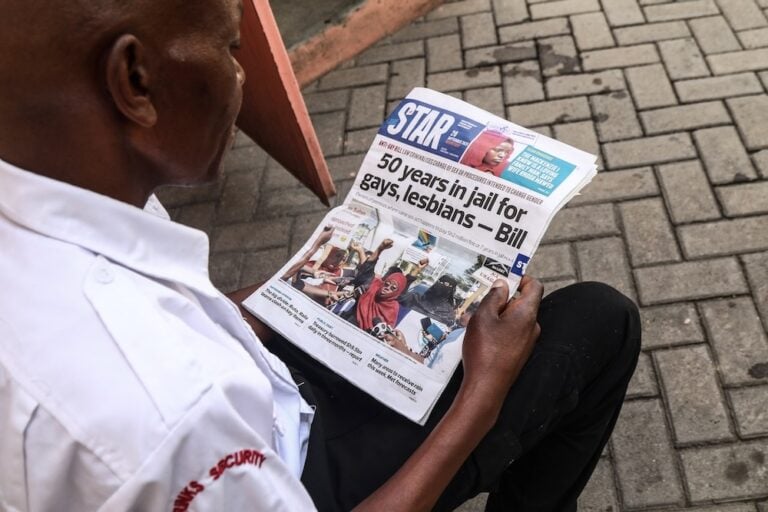(ARTICLE 19/IFEX) – The following is an ARTICLE 19 press release and letter addressed to President Daniel arap Moi expressing concern over the case of publisher Tony Gachoka: **Updates IFEX alerts of 23 August, 16 July, 24 February, 17 February and 16 February 1999** 31 August 1999 – For immediate release KENYAN ROUGH JUSTICE UNDERLINES […]
(ARTICLE 19/IFEX) – The following is an ARTICLE 19 press release and letter
addressed to President Daniel arap Moi expressing concern over the case of
publisher Tony Gachoka:
**Updates IFEX alerts of 23 August, 16 July, 24 February, 17 February and 16
February 1999**
31 August 1999 – For immediate release
KENYAN ROUGH JUSTICE UNDERLINES MEDIA’S CORRUPTION CLAIMS
ARTICLE 19, the International Centre Against Censorship, today called for
international action on the case of Kenyan publisher Tony Gachoka, who was
sentenced to six months in prison and fined Ksh 1 million ($13,500) in
connection with articles on corruption in the judiciary run in the Post on
Sunday.
The presiding chairman of the Court which heard the case, Hon. Mr. Justice
Gicheru, called the defendant’s lack of representation at the trial “…an
obvious miscarriage of justice”, but his was the only dissenting voice.
Three of the judges named in the Post on Sunday were actually presiding at
the trial.
The punishment, for ‘contempt of court’, was the result of proceedings
concerning allegations that several judges had received bribes in connection
with the major financial ‘Goldenberg’ scandal.
Andrew Puddephatt, Executive Director of ARTICLE 19, said today:
“ARTICLE 19 has grave doubts as to whether Tony Gachoka has had a fair
hearing. We are forced to conclude that his imprisonment is intended as a
warning to those who ask questions about corruption in high places.
“We call for the immediate and unconditional release of Tony Gachoka, the
cancellation of the fine, and for the Post on Sunday to be allowed to resume
publication,” he added.
The international rights group’s criticisms hinge on three main points:
– Three of the judges who handed out the sentence of imprisonment in the
Court of Appeal had been named in the articles for which Tony Gachoka was
charged with contempt of court
– Tony Gachoka’s claims that he was denied a proper opportunity to defend
himself before the Court of Appeal
– Questions over the use of the Court of Appeal to try the case as a court
of first instance, since there is no right of appeal from the judgement.
ARTICLE 19 is concerned that the Kenyan authorities are making illegitimate
use of the 1964 Contempt of Court Act to curtail freedom of expression now
that other means of harassment such as sedition and arbitrary banning orders
have been removed from the statute books.
The letter addressed to President Daniel arap Moi follows:
His Excellency Daniel arap Moi
President of the Republic of Kenya
Office of the President
Harambee House
Nairobi
Kenya
FAX: 00 254 2 721515/210150
Your Excellency,
ARTICLE 19 is writing to add its voice to those who have expressed grave
concern about the six-month jail sentence imposed by the Court of Appeal on
Tony Gachoka, publisher of the Post on Sunday, for contempt of court.
ARTICLE 19 believes that custodial sentences are disproportionate punishment
for content-related offences such as that which Tony Gachoka is alleged to
have committed. We also believe that the fine of Ksh 1 million – reportedly
the largest ever imposed upon a publishing company in Kenya – which
accompanied the custodial sentence is excessive in the extreme. The scale of
the fine will also have a major “chilling effect” on freedom of expression.
We are also concerned that three of the judges who handed out the sentence
of imprisonment in the Court of Appeal had been named in the articles for
which Tony Gachoka was charged with contempt of court. The articles alleged
that several judges had received bribes in connection with the Goldenberg
scandal. In addition, Tony Gachoka has alleged that he was denied a proper
opportunity to defend himself before the Court of Appeal – an allegation
which appears to be supported by the single dissenting judgment of Presiding
Justice Evans Gicheru. Finally, it is at least open to question whether the
Court of Appeal has jurisdiction to try contempt cases, which power is
normally vested in a court of first instance – for example, the High Court.
All of these factors raise grave doubts as to whether he can be considered
to have had a fair hearing. It is impossible to avoid concluding that his
imprisonment is politically-motivated.
The case of Tony Gachoka is not the first example of the use of the 1964
Contempt of Court Act to unduly restrict freedom of expression in Kenya.
Following on from its use against two journalists working for The People in
1994, who were imprisoned for several months, we fear that this legislation
may increasingly come to be used to silence critical media voices in a
context where other options, such as sedition or arbitrary banning orders,
are no longer available in law. Such charges have a debilitating effect on
media houses and individual media workers because of the financial pressures
of a trial, mounting legal costs and fears on the part of businesses about
continuing to place advertisements in an affected publication.
In these circumstances, ARTICLE 19 calls for the immediate and unconditional
release of Tony Gachoka, the cancellation of the fine, and for the Post on
Sunday to be allowed to resume publication. We would be grateful for your
response to the concerns which we have raised.
Yours sincerely,
Andrew Puddephatt
Executive Director
Recommended Action
Similar appeals can be sent to:
Appeals To
His Excellency Daniel arap Moi
President of the Republic of Kenya
Office of the President
Harambee House
Nairobi
Kenya
Fax: +254 2 721 515 / 210 150
Please copy appeals to the source if possible.


